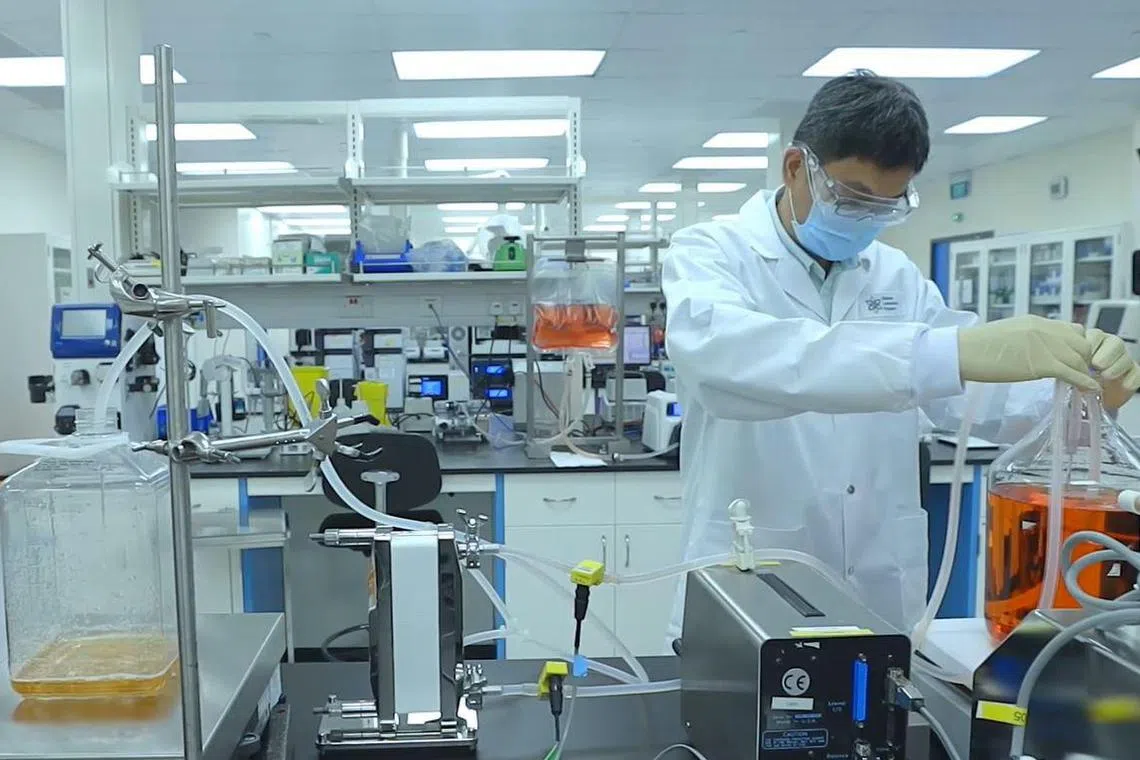A*Star, Hilleman Laboratories to jointly study new tech to develop Nipah virus vaccine
Sign up now: Get ST's newsletters delivered to your inbox

Researchers from Hilleman Laboratories and the Agency for Science, Technology and Research will design and test different circRNA constructs to prove that the technology can work as a vaccine precursor.
PHOTO: HILLEMAN LABORATORIES
SINGAPORE – A vaccine for the Nipah virus could be on the horizon, thanks to research on a new vaccine technology.
Vaccine research organisation Hilleman Laboratories has announced a collaboration with the Agency for Science, Technology and Research (A*Star) to study the use of novel circular ribonucleic acid (circRNA) technology to develop a Nipah virus vaccine.
The technology can also be used to develop vaccines for other infectious disease pathogens, said Hilleman Laboratories in a media release on Tuesday.
The research project will examine the viability of a circRNA vaccine, a form of RNA vaccine technology whose potential benefits includes greater flexibility in adapting a vaccine to evolving virus strains, allowing for faster response to an outbreak.
Both Pfizer-BioNTech and Moderna employed mRNA, another form of RNA vaccine technology, for their Covid-19 vaccines.
The Nipah virus – which is fatal in 40 per cent to 75 per cent of cases – is transmitted from animals to humans through direct contact with the animals and aerosol droplets, and between humans.
Those infected by the virus may contract encephalitis, or swelling of the brain.
It was first identified in Malaysia in 1998, when an outbreak of the disease among pigs passed on to humans, resulting in the deaths of 108 people.
More recently, an outbreak in Bangladesh earlier in 2023 led to the deaths of eight people.
There is currently no vaccine available against the Nipah virus, though the United States National Institute of Allergy and Infectious Diseases has started a clinical trial of a vaccine developed by Moderna.
Researchers from Hilleman Laboratories and A*Star’s Genome Institute of Singapore and Bioprocessing Technology Institute (BTI) will design and test different circRNA constructs to prove that the technology can work as a vaccine precursor.
The study will also look at whether circRNA provides better and longer-lasting immune response, as well as whether there is less need for booster doses using the technology than current commercial mRNA vaccines.
It will also study if circRNA is more stable at regular fridge temperatures of between 2 deg C and 8 deg C.
“The collaboration is expected to enable the development and manufacturing of more accessible RNA vaccines, especially for developing countries,” said Hilleman.
In response to queries from The Straits Times regarding when a vaccine will be available, Hilleman said proof of concept must be established over a period of 12 months before the product can proceed to clinical testing on people to demonstrate its safety and efficacy.
“The human trials will need to be performed in Singapore and Africa, and fast-tracked in partnership with other large vaccine manufacturers,” said a Hilleman spokesman.
Should the tests on the Nipah virus vaccine prove successful, the technology will be used to develop vaccines against other infectious diseases with “epidemic and pandemic potential” in Singapore and the region.
Professor Ng Huck Hui, assistant chief executive of A*Star’s Biomedical Research Council, said the technology could address storage and cost challenges facing distribution, enhancing Singapore’s preparedness against future pandemics.
Hilleman chief executive Raman Rao said: “We believe the collaboration with A*Star will bring us closer towards establishing circular RNA as a platform that would enable the development of many vaccines to meet urgent global public health needs and address issues such as thermostability, and potentially eliminate the need for complex cold chain requirements for more effective prevention and management of disease outbreaks.”
In 2021, Hilleman – a collaboration between US drug-maker Merck and British charitable foundation Wellcome Trust – announced it that it would invest $80 million over five years in a hub for vaccine and biological drugs development and manufacturing in Singapore.


